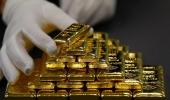'A 10 to 15 per cent allocation to gold in portfolios reduces risk without compromising on potential returns.'

A woman shops for gold jewellery at a showroom in Nagpur. Photograph: ANI Photo
Experts are of the view that with fundamentals remaining supportive, gold could climb over the next 6 to 12 months.
Rate cuts a key driver
The recent 50 basis-points (bps) rate cut by the United States Federal Reserve (US Fed) has provided further impetus to the yellow metal. Gold has a negative correlation with real interest rates.
"Hereafter, the decline in interest rates should be larger than the decline in inflation, which should be supportive for gold prices," says Chirag Mehta, chief investment officer, Quantum Mutual Fund.
"As real interest rates decline, the opportunity cost of holding gold comes down and more investors move into it," explains Mehta.
The frequency of rate cuts by the US Fed may increase over the next 6 to 12 months, pushing the price of the yellow metal further up.
Geopolitical tensions -- the Russia-Ukraine war and the West Asia conflict -- show no signs of abating.
"In such an environment, investors seek refuge in this safe-haven asset," says Shashank Pal, chief business officer, Prabhudas Lilladher Wealth Management.
Central banks have been diversifying their reserves away from the US dollar and into gold.
"Most major economies have been increasing their gold reserves in recent years. China, one of the top consumers of gold, paused its purchases in May," points out Deveya Gaglani, senior research analyst-commodities, Axis Securities.
"If the People's Bank of China resumes purchases, that will be positive for the price of gold," adds Gaglani.
The significant cut in import duty on gold in India in late July has been a shot in the arm for domestic demand.
According to the World Gold Council's latest report, 'Anecdotal reports suggest the duty reduction was followed by strong buying interest from jewellers as well as consumers.'
With all these drivers still in place, gold's price is likely to increase.
"With the growing likelihood of an additional 50 bps Fed rate cut, gold's price may rise by 4 to 5 per cent in the next 6 to 8 months," says Gaglani.
He expects the domestic price to touch Rs 80,000 per 10 gram, and the price on the Comex to touch $2,850 per ounce.

Strong dollar index could impede rise
The yellow metal may struggle if interest-rate cuts in the US are not significant, and the US economy remains stronger than expected.
"A strengthening dollar index can put pressure on gold prices, as the two are inversely correlated," says Gaglani.
"An improved economic scenario in the US, indicated by positive data such as non-farm payroll data, GDP growth, and consumer confidence, can reduce the demand for gold," says Gaglani.
According to Mehta, while the long-term outlook for gold remains positive, there could be volatility in the short term.
Enter with a long-term perspective
Retail investors should allocate 10 to 15 per cent of their portfolios to gold, using instruments like gold exchange-traded funds (ETFs) and gold fund of funds (FoFs).
"A 10 to 15 per cent allocation to gold in portfolios reduces risk without compromising on potential returns," says Mehta.
After the recent run-up, lump-sum investment should be avoided.
"Over the long term, you should invest in gold systematically. This provides an opportunity to invest at lower levels during periods of underperformance," says Gaglani.
Disclaimer: This article is meant for information purposes only. This article and information do not constitute a distribution, an endorsement, an investment advice, an offer to buy or sell or the solicitation of an offer to buy or sell any securities/schemes or any other financial products/investment products mentioned in this article to influence the opinion or behaviour of the investors/recipients.
Any use of the information/any investment and investment related decisions of the investors/recipients are at their sole discretion and risk. Any advice herein is made on a general basis and does not take into account the specific investment objectives of the specific person or group of persons. Opinions expressed herein are subject to change without notice.
Feature Presentation: Ashish Narsale/Rediff.com












 © 2025
© 2025